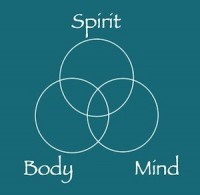Classification of the origins of illnesses
The possible sources of an illness are numerous. The most important ones are explained in detail below: 1.- Negative emotions (fear, envy, anger, hatred, sadness, injustice, low self-esteem) which are created by external circumstances (problems related to colleagues, family members, friends, etc.); lack of love, financial problems, a bad family or school education, dramatic events in one’s life, such as the loss of a loved one, traumatic events, such as sexual abuse, etc. or blocking the expression of negative emotions.
2.- Lack of spiritual values such as ethics, moral values, religion; which creates a negative internal energy.
3.- Stress, work, family, home, projects with deadlines. Lack of activities to cope with stress, such as yoga, meditation, etc.
4.- Unhealthy diet: processed foods, additives, addictive substances (alcohol, coffee, chocolate, sugar, ...), inadequate quantities (excess or shortage), poor quality, unbalanced diet, improper diet, environment for meals, inadequate timing and frequency, etc.
5.- Toxins and medicine: heavy metals, chemical products, vaccines, medicine, air and water pollution, food contamination, electromagnetism, tobacco, drugs. In this article some of the most common toxins will be explained in detail.
6.- Lack of rest or sleep: insomnia, overwork, inadequate sleeping environment.
 7.- Lack of physical activity: sport, walking, housework, physical work.
7.- Lack of physical activity: sport, walking, housework, physical work.8.- Lack of contact with nature, lack of exposure to sunlight: forests, mountains, sea, sun, moon, stars, rivers, lakes, animals. Exposure to sunlight is just as necessary as food!
9.- Physical traumas or accidents: traffic accidents, falls, natural disasters caused by fire, water or air.
10.- Exposure to infectious agents (for those whose immune system is rather weak): animal bites or stings, trips to countries where there are endemic diseases, infections at school or at work.
11.- Lack of intelectual activity: watching TV all day, abandoning the personal care in other hands, avoiding responsibilities… unfortunately many elder, children and sick people completely abandone their physical and intelectual activity, they loose their imagination and dreams and with this, the sense of life.
12.- Lack of means: poverty.
Body-mind-spirit relationship

The body, mind and spirit are closely related, as explained in a previous article. It is often difficult to discover the real root of the problem, and whether it is connected to the body, the mind or the spirit. The most powerful part of these three is undoubtedly the spirit, which can heal body and mind from illness. However, when someone is not spiritual, it is necessary to cure their illness from a physical or mental point of view.
The causes of an illness are usually multifactorial and variants of the previously mentioned circumstances tend to coexist, such as stress and lack of physical activity. Normally one condition leads to others: emotional conflict can cause lack of sleep, for example.
It is necessary to remain well-balanced and to consider all aspects of life. Most people focus on a specific aspect but forget about others. For instance, some people are very spiritual but neglect their diet or their stress levels while others practise an extreme amount of physical activity but neglect their spiritual life. When we nurture all aspects of life and we are in harmony with nature, we create a positive environment.
By this I don’t mean that it is necessary to be perfect in every aspect of life. In the modern world it is simply impossible to do as much physical exercise as desirable. Moreover, it is impossible to have a spiritually rich life, eat healthily, live without stress, etc. at the same time. However, it is not impossible to make a minimal effort in each area. In the last principle of Living Fully Nourished some ideas about combining all these activities are offered.
The trigger of an illness
The easiest way of finding the trigger of an illness is considering the prior few months carefully to see whether there was an important change in that period, such as an emotional conflict, an accident, an extremely stressful situation, a change in the habitual diet, a vaccine, etc.
However, if someone has been suffering from an illness either since their childhood or for several years, it can be difficult to remember what could have been the cause. It can also be a chronic illness that started very slowly or even one that has existed since someone’s birth and has been getting worse for many years. In these cases we are normally talking about genetic diseases or diseases to which we have a genetic predisposition.
 But the expression of the genes, the so called epigenetics, depend on various environmental factors which range from the diet to toxins or to the emotional state. This means that by reversing the environmental conditions it is possible to restore the epigenetics and to deactivate the gene that causes a specific disease. Consequently, it is necessary to find the factor which activates this gene.
But the expression of the genes, the so called epigenetics, depend on various environmental factors which range from the diet to toxins or to the emotional state. This means that by reversing the environmental conditions it is possible to restore the epigenetics and to deactivate the gene that causes a specific disease. Consequently, it is necessary to find the factor which activates this gene.
A significant emotional, mental or spiritual strain can remain unnoticed for a long time and thus render a person more vulnerable to other, more noticeable factors. As a result, when there is a little shortage in one factor, the person might think that it is the trigger, while the real problem is another shortage.
 This way a chronic shortage of rest or chronic stress for instance could not be taken seriously enough due to someone’s dedication to their work. As a consequence, this person could suffer from digestive problems which might cause another illness, for example migraine. This person is very much aware of his diet and eats healthily. It seems to him that the more dairy products he eats, the worse he feels and when he decreases the amount of them, he feels better. One day he goes to take a food intolerance test and it results that he has indeed developed an intolerance to dairy products. He eliminates these from his diet and so his migraine disappears for a few months. Until he develops another intolerance, this time to eggs. And it goes on like this with different foods. This person will continue developing different kinds of food intolerance unless he treats the root of his illness: the stress and lack of rest.
This way a chronic shortage of rest or chronic stress for instance could not be taken seriously enough due to someone’s dedication to their work. As a consequence, this person could suffer from digestive problems which might cause another illness, for example migraine. This person is very much aware of his diet and eats healthily. It seems to him that the more dairy products he eats, the worse he feels and when he decreases the amount of them, he feels better. One day he goes to take a food intolerance test and it results that he has indeed developed an intolerance to dairy products. He eliminates these from his diet and so his migraine disappears for a few months. Until he develops another intolerance, this time to eggs. And it goes on like this with different foods. This person will continue developing different kinds of food intolerance unless he treats the root of his illness: the stress and lack of rest.The opposite could also happen to someone who doesn’t pay much attention to his diet but is very much aware of the damage that stress causes to his health. He goes through a period when work is more stressful than usual, and he starts having reflux problems and stomach ulcers or arrhythmia and heart problems, which he puts down to stress. However, if he had followed a sound diet, he would have been able to withstand the stressful period without any health problems.
A one-off event in life can act as a trigger, but normally there is another factor which existed previously and has created a weakness. In these cases people tend to identify the specific event as the cause, while the real cause of the illness is the one that originally triggered this vulnerability.
Some other examples of frequent cases
| debilitating factor or genetic predisposition | trigger or environmental factor | illness |
| inadequate nutrition that weakens the immune system | exposition to the influenza virus | flu |
| inadequate nutrition that alters neurotransmitters | relational conflict with a person | depression |
| inadequate nutrition that weakens bones | accident or fall | bone fracture |
| inadequate nutrition that generates inflammation | sleeping in an uncomfortable bed | back pain |
| inadequate nutrition that generates inflammation | streching of the back of the neck | torticollis |
| inadequate nutrition or stress that develops candida and inflammation | natural weakness of the immune system on the days prior to the menstrual cycle | premenstrual syndrome |
| inadequate nutrition + weak spiritual values | bullying at school, media images | anorexia |
| inadequate nutrition + weak spiritual values | the loss of a loved one | depression (not to be confused with the necessary sorrow) |
| prenatal mercury poisoning (placental transfer) | vaccination | autism |
| repeated antibiotic treatment + lack of exposure to natural agents in someone’s childhood | exposure to allergens | allergies |
| chronic stress+ lack of physical activity | bad news | heart failure |
| genetic predisposition to cancer | high levels of transgenic soy consumption | breast cancer |
| toxins that destroy the skin or mucosa protection (chlorine in swimming pools, cosmetics, contraceptives, etc.) | exposure to human papillomavirus | plantar warts or warts on hands or uterus |
It is impossible to control triggers, as they are events in our lives which are outside our control, neither the inherited genetic predispositions. When we suffer from an illness, we normally prefer to blame external factors such as other people or unfortunate events (a family member, a colleague, the outbreak of a disease, a fall, etc). However, it is actually we who need to assume responsibility for what is happening in our lives. As many great thinkers of our times believe, each person creates their own reality and attracts positive or negative events with their thoughts. If we work on being internally balanced and physically, mentally and spiritually strong, not only will the forces of the universe be on our side, but we will feel lucky and have the necessary strength to deal with challenges and unpleasant events as they happen.
This way we can work on avoiding the weakening factor so that even if a trigger appears one day or if we possess the gene which could cause a specific illness, we can be strong enough to stay healthy without getting ill, or at least not seriously. In the case of genetic predisposition we can be careful that environmental factors don’t bring about the expression of the specific gene.
Analysis
.jpg) There are some tests to determine some of the possible causes of a disease: toxicology, bacteriology, parasitology, food intolerance, virology, etc., functional analyses that are different from conventional ones. However, it is often difficult to identify the cause. Often it is impossible for the therapist to become adequately familiar with all aspects of someone’s life in order to find it. For this reason it is important for the person to think about his/her life and the agents he/she is exposed to. It is indeed necessary to know yourself thoroughly. This idea is the second principle of the method.
There are some tests to determine some of the possible causes of a disease: toxicology, bacteriology, parasitology, food intolerance, virology, etc., functional analyses that are different from conventional ones. However, it is often difficult to identify the cause. Often it is impossible for the therapist to become adequately familiar with all aspects of someone’s life in order to find it. For this reason it is important for the person to think about his/her life and the agents he/she is exposed to. It is indeed necessary to know yourself thoroughly. This idea is the second principle of the method.
Studies of links between diet and illness
There are more and more statistic studies that claim a relationship between different kinds of illness and their triggers. As a result, we can find different studies that relate almost every kind of foods to every kind of illness. However, we need to be critical when we read these studies. The mere existence of a kind of relationship doesn’t necessarily imply causality.
For example, the famous “China Study” which relates the consomption of protein to cancer is a study that merely compiles observations. There has not been any kind of double-blind study to verify if the relationship is genuine. There is the possibility that in the case of people with a high intake of meat, other common factors lead to the development of cancer. For instance, in general, these people are used to consuming more alcohol, as well as leading a sedentary lifestyle, while vegetarian people are accustomed to taking better care of their health: they exercise, meditate, buy organic food, etc. Also, it isn't specified the kind of protein or meat: grass and pasture fed or factory and grain fed? Organic or with antibiotics and hormones?
Also, it must be taken into account who (pharmaceutical company, food industry,...) is funding the study, so maybe some biases can exist.
Dr. David Katz gives a very wise advice: "Don’t just read opinions that confirm your own. If all you read is the stuff that agrees with what you want to believe in the first place, you’re taking a biased approach and not likely to wind up with a balanced perspective. You’ve got to read the best stuff that disagrees with what you’re hoping is true. Then, if you can still believe what you wanted to believe, it may be robust."
Conclusion:
The analysis and a consultation with an integrative/holistic therapist can help identify the weakest aspect, which could be the origin of an illness. However, due to the infinity of factors and the therapist’s difficulties in becoming familiar with all aspects of a person’s life, it is necessary for the person to work on getting to know himself/herself profoundly in order to find the origin of an illness. Within Living Fully Nourished approach, useful ideas are provided to help with this process.
Once the causes of illness are successfully identified, and such an important step has been taken in the process of healing, we can continue with the next one. This step is about avoiding the source and addressing deficiencies that create illness which are other principles of he Living Fully Nourished approach.
.jpg) A person should be well-nourished from all perspectives: physically, mentally, emotionally and spiritually.
A person should be well-nourished from all perspectives: physically, mentally, emotionally and spiritually. 







 Gemma Calzada is a Holistic Nutritionist Ph.D. and a certified GAPS practitioner, accredited by ASCA. Her mission is to improve health through nutrition and to help people suffering from a dietary intolerance to live happily.
Gemma Calzada is a Holistic Nutritionist Ph.D. and a certified GAPS practitioner, accredited by ASCA. Her mission is to improve health through nutrition and to help people suffering from a dietary intolerance to live happily. 
